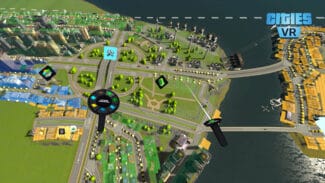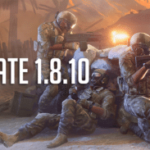How exactly is Fast Travel Games bringing the scale of Cities: Skylines to VR? We spoke to the studio to find out.
Announced at our Upload VR Showcase earlier this month, Cities VR is an adaptation of Colossal Order’s enormous city-building sim, designed to work with the Quest 2. Elements of the game — like the isometric view — make perfect sense for the platform. Other aspects — like creating massive urban sprawls on standalone hardware — seem a bit more challenging.
We spoke to Creative Director, Erik Odeldahl, about how Fast Travel is approaching the project. He shared details on the size of cities and structure of the game, as well as if it might ever come to headsets beyond Quest 2. Read on below!
UploadVR: What exactly is this game’s relationship to the original? Is it a direct port with all the features, headed to VR?
Erik Odeldahl: Cities: VR is how we bring the full city simulation of the original game to VR. It plays and feels in a similar way. The main difference is that it plays out on a smaller geographical scale than what you’ll find on PC and consoles. By focusing on a smaller area to build your city in, we can keep the simulation intact and let the player be in control of a lot of the minutiae of being the mayor of a city. That said, you can still build big and amazing looking cities in our game!
UVR: What do you think it is about the Cities experience that works in VR?
EO: I believe there is an amazing sense of scope in our game as players go from bird’s eye view down to street level and see their neighborhoods come alive from up close, and we have also implemented tactile feedback and custom made tools so that you feel almost like an artist when you design and create your city. I also think playing a Cities game in VR boosts the emotional connection to your creations, I keep finding myself caring almost too much about the well-being of my citizens!
UVR: How does the structure of the game play out? Is there a campaign to follow?
EO: We are still experimenting with how to best open the game for players new to Cities simulation, but the current direction we’re working in is the following: The game ships with several maps in three different themes: Nordic, Tropical and Temperate. The player is able to choose which map to play in, and regardless which one you choose to start, you will be presented with a tutorial that teaches you the basics of city building. You don’t have to play the tutorial, but it’s a really nice way to get into Cities for those that are new to it!
Cities: VR is a game about experimenting with the tools you have. What happens if you build your city a certain way instead of another? How quickly can you maximize the population in an area? How can you make them happy? There is no story for the player to follow. It’s very much a sandbox that invites you to try different strategies out.
UVR: This seems like a technically ambitious game for Quest, just how large can cities become?
EO: It is a technically ambitious and dare I say challenging game to build for a handheld VR device. We have decided to lock the size of the cities to one tile which is 2x2km. We found this the best choice on a Quest 2 for several reasons, the main ones being it lets you get really close to your creation while simultaneously allowing us to run the full city simulation without any major changes from other Cities games you might have played.
UVR: What are some of the harder aspects of the game to translate to VR?
EO: We realized early on that our biggest challenge is the immense scale of the game on PC and other platforms. Scale however is appreciated differently in VR, so it also turned into the thing that really gives it its strength. By letting the player come much closer to their creation, I feel they appreciate it more and really become a part of their city. This is one of those things that is hard to communicate in words and videos, and that just has to be experienced in a headset.
Being a mayor in Cities involves a lot of big choices such as where do I place the industrial zones, as well as smaller choices, such as how much do you tax the citizens. Making sure these choices translate well into VR UIs takes a lot of work and time, but we feel we’re doing a pretty good job there.
UVR: Are there plans for other platforms?
EO: While Cities: VR is only announced for Quest 2 we’ll have more information to share on potential additional platforms at a later date.
UVR: This is the first time Fast Travel has effectively remastered a game for VR – do you plan to do more of this in the future?
EO: It depends very much on the project. We saw so much potential in Cities and that made the choice to adapt it to VR easy for us. This is not the case with a lot of other – admittedly really cool! – flat screen titles. VR is very different from a design perspective and getting the player’s presence in the game world right is always what gets the most focus from our teams.
Cities: VR is coming to Quest 2 next Spring.







